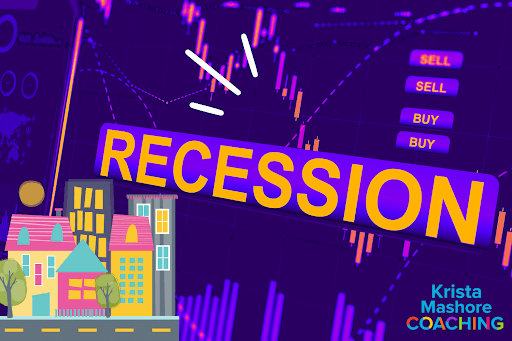There's no denying that the real estate market, like many other industries, has taken a hit in recent years. While some homes are snatched up quickly and above list price, many are sitting longer than just a few years back.
With rising inflation and wages not keeping pace, there is plenty of talk in economic circles of a looming recession, and the question comes to mind, are we in a real estate recession?
But does a full-blown recession mean the housing market is in trouble, or are growth opportunities still available?
Real estate has always been a vital indicator of the state of the economy; with homes sitting on the market longer and borrowing costs rising, many are left wondering what the future holds for the industry.
To help your clients better and succeed in a challenging market, it's crucial to take a closer look at the current state of the real estate market and what it means for investors, buyers, and sellers.
It is difficult to say definitively whether or not we are in a recession, but there are some signs that the market is slowing down.
One indicator is that home sales have been declining in recent months.
According to the National Association of Realtors, existing home sales fell 2.7% in March 2023 from the previous month. This is the third consecutive month of declining sales.
Another indicator is that home prices are starting to cool off. The S&P CoreLogic Case-Shiller 20-city home price index rose 20.6% in February 2023 from the same month a year earlier. This is the slowest pace of annual growth since December 2018.
Interest rates are also rising, which is making it more expensive to borrow money to buy a home. The Federal Reserve has raised interest rates twice in 2023, and it is expected to raise rates several more times this year.
All of these factors suggest that the real estate market is slowing down, but that doesn’t mean that we’re in a recession (yet) and that there are simply no more opportunities to be had.
A Quick Real Estate Market Overview During Recessionary Periods

Figuring out are we in a real estate recession is a complex situation.
An economic downturn, like a recessionary period, can significantly impact the real estate market, affecting both commercial and residential properties.
The truth is these downturns can cause a reduction in housing prices, rental rates, the availability of loans, and the construction and development of new properties.
To understand the impact of a recession, one of the most obvious ways a recession affects the real estate market is through a decrease in housing prices.
During challenging economic times, the demand for homes typically decreases, resulting in a surplus of available homes. This oversupply forces prices downward, making it an ideal time for potential buyers to enter the market.
Rental rates also tend to decrease during a recession. Fewer job opportunities and lower salaries can make it difficult for tenants to pay rent, leading to lower rental rates and increased vacancies. As a result, landlords may have to rely on incentives such as offering free rent to attract new tenants.
Another critical factor is the availability of loans can be affected by recessions and become harder to come by. Banks may be reluctant to lend money, changing requirements for borrowers and making it more challenging for individuals to acquire financing to buy properties.
As a result, this could lead to a reduction in demand for housing and an overall decrease in property values.
What Is The Current State Of The Real Estate Market?
The real estate market has undergone a significant transformation in recent years, with many experts questioning whether or not the market is headed towards a recession.
Factors such as rising mortgage rates, higher unemployment rates, stagnant wages, and a shortage of homes for sale have all contributed to a slowdown in some regions.
The critical question to answer is whether we are currently experiencing a real estate recession or if one is coming.
While it’s true that the real estate market has been experiencing a slowdown in activity due to higher mortgage rates and a shortage of homes for sale, it’s generally thought the market is not in a recession but is experiencing a temporary hiccup in growth.
That said, the decreasing affordability and higher home prices will cause fewer prospective buyers to enter the market, possibly leading to a decrease in housing demand.
Homes For Sale And Supply Of Homes In Recessionary Periods

To help your clients, you must understand are we in a real estate recession and how the recession impacts the housing market. Since the supply of homes tends to increase while the demand for them declines during recessionary periods, there will be more inventory on the market. This increase in the supply of homes will be primarily due to the high number of foreclosures and bank repossessions resulting from the economic downturn.
At the same time, the demand for homes decreases because of the higher unemployment rates, lower median home prices, and increases in fixed-rate mortgages.
While recent data points toward a bleak picture for home sales, with an increase in inventory and slower rates of home sales, we haven’t seen that in many markets.
Prospective Buyers & Potential Buyers in a Recessionary Period
Another thing to understand is how a recession impacts potential buyers and sellers. In a recessionary period, prospective and potential buyers in the real estate market tend to become more cautious before deciding to purchase a home.
When deciding whether to buy a home during a recession, buyers should consider various factors, such as the stability of their job and income, the state of the housing market, and the potential for long-term price appreciation.
And while a recession can bring about price drops and declines in median home prices, buyers also need to consider the long-term impact of this period on their investment.
A critical factor in understanding the housing market during a recession is the impact of supply and demand on the price of a home.
Reduced demand for homes during a recession can lead to a decline in housing activity and availability, which may result in lower home prices. In addition, heightened unemployment rates can further dampen demand, creating a buyers' market with less competition and bidding wars.
On the other hand, mortgage interest rates can be lower during a recession, making it an attractive period for those struggling with affordability.
Remember that as individuals try to conserve their financial resources, they may be less likely to make significant financial commitments such as a home purchase. This could also lead to a decrease in home prices, making it more affordable for new buyers to enter the market.
However, it could also lead to reduced availability of homes, as sellers choose to hold onto their properties until market conditions stabilize, which will continue the trend of home prices rising.
What’s understood is that the housing market is in a state of flux. How it will impact the housing market in the short term is not as well known.
Limited inventory makes agents and clients have to provide competitive offers to close a deal, but rising interest rates are turning many new buyers away.
The State Of The Housing Market
The real estate market is a complex system influenced by many factors, including the economy, interest rates, and supply and demand.
However, it is essential to note that the market is still in a strong position overall.
Home prices are still rising, and there is still a lot of demand for homes. The market may continue to slow down in the coming months, but it is unlikely to enter a recession.
Here are some additional factors that could affect the real estate market in the coming months:
- The economy: If the economy enters a recession, it could lead to a decline in home sales and prices.
- Interest rates: If interest rates continue to rise, it could make it more expensive to borrow money to buy a home, which could also lead to a decline in home sales and prices.
- Supply and demand: If the supply of homes on the market increases, it could put downward pressure on prices. However, if demand for homes remains strong, prices could continue to rise.
- A decline in the stock market: The stock market has been volatile in recent months, and a significant reduction could lead to many people's wealth loss. This could make it more difficult for people to qualify for a mortgage or afford a down payment.
- A rise in unemployment: If the economy weakens, more people could lose jobs. This would reduce the number of people who can buy homes, leading to a decline in demand.
- A decline in consumer confidence: If people become more pessimistic about the future, they may be less likely to buy a home. This could lead to a slowdown in the real estate market.
It is important to note that a recession is not inevitable.
The Federal Reserve is taking steps to prevent a recession, and the economy is still growing. However, several factors could contribute to a recession, and it is essential to be aware of these risks.




